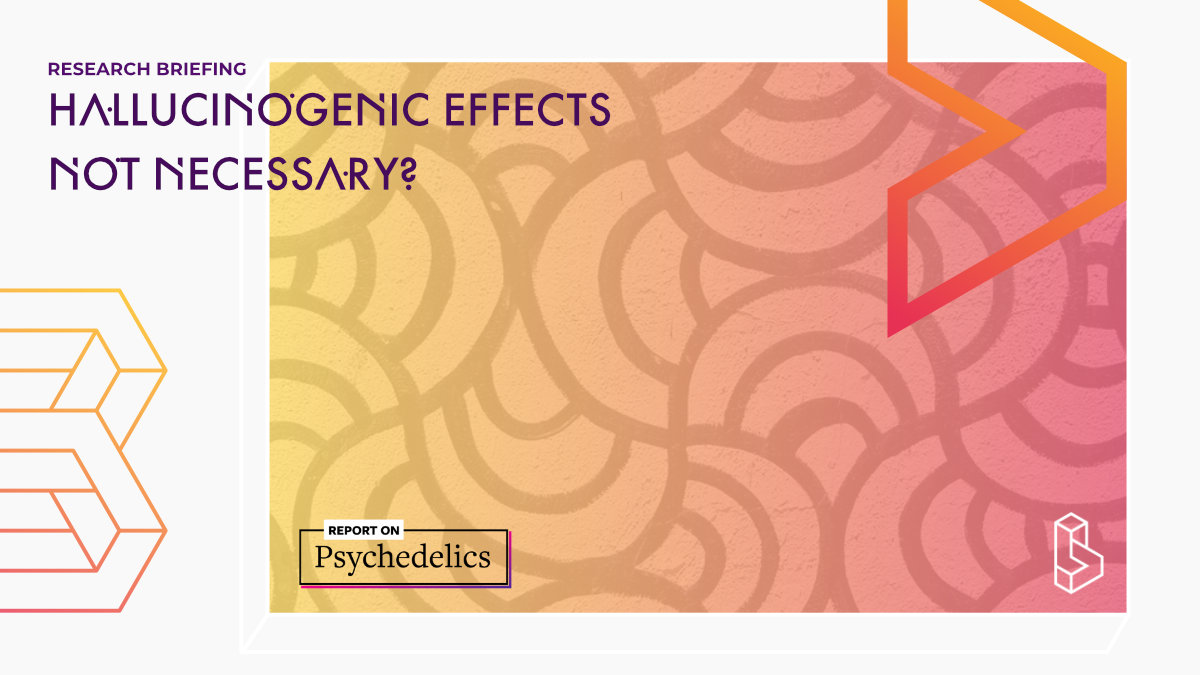This research briefing is co-published with the excellent Report on Psychedelics.
April 21st 2021
In The Research Briefing:
- Psilocybin pitted against antidepressant and wins on many accounts
- What if the anti-depressant and hallucinogenic effects of psychedelics are independent?
PSILOCYBIN
Psilocybin versus escitalopram for depression
Many studies have been showing the positive effects that psilocybin can have for those suffering from depression. Although the studies are still small, ranging from a few to tens of participants, most are showing large reductions in depression scores and remission in up to 54% of patients.
Whereas other studies compared psilocybin against a placebo, the current study pitted it against one of the best antidepressants. The 59 participants were randomly assigned to one either receive six weeks of escitalopram, or two high doses of psilocybin. The researchers, under the lead of Robin Carhart-Harris, then compared the scores of the participants after six week to that at the start.
The results from three angles
- There was no significant difference between the self-reported scores of depression (QIDS-SR-16) between the two groups, both did significantly improve over the six weeks of the study
- Other measures of depression, anxiety, and wellbeing did favor psilocybin, but it should be noted that a (arguably necessary) statistical correction hadn’t been done on these results
- The psilocybin group also reported being able to feel more compassion, intense emotions, and pleasure, and felt less drowsy than the escitalopram group
So does this mean that psychedelics will overtake antidepressants (SSRIs) anytime soon? Not yet, larger studies that show effects on the primary measure are still necessary. The participants in the current study also self-referred themselves after hearing about the study and expectancy effects (e.g. by hearing about how great psilocybin is via media) can still play a large role here.
But if the study has shown anything, it is that psychedelics can be as good as SSRIs with fewer negative side-effects.
IN MICE
Mice get better without the trip
Ketanserin is an antagonist of the serotonin (5-HT) 2a receptor. This means it will inhibits the action of the 5-HT2a receptor. If you imagine the receptor being a keyhole and LSD being a key that unlocks everything inside that house (the psychedelic effects), ketanserin in the duct tape that prevents the key from unlocking the door.
In humans, a study at the end of last year showed that when you give participants ketanserin, and then a high dose of LSD, no psychedelic effects were observed. We can say with confidence that ketanserin is able to block psychedelic or hallucinogenic effects of LSD. This study was done with healthy participants and the researchers didn’t specifically look at improvements on scores of depression.
That is what an exciting mice study that just came out did. Nathalie Hesselgrave and colleagues first exposed mice to chronic stress. This made them less attracted to positive things such as sugar water and the urine of female mice (i.e. potential mates). After the mice were thoroughly depressed, they gave them one of four treatments; placebo, only ketanserin, only psilocybin, or both. After that, they presented the sugar water and female urine again.
This is what happened to the mice
- As expected, the mice who were treated with ketanserin (the second and fourth group) showed no acute signs of hallucinogenic effects (the head-twitch response is the usual indicator of 5-HT2a receptor activation)
- The mice who received a placebo or only ketanserin (the first and second group) were still depressed and weren’t going for the females or sugar water
- And the mice who received psilocybin (the third and fourth group) showed significant improvements in the preference for sugar water and female urine
A study in mice doesn’t necessarily mean that the same applies to humans. We have seen mice grow two or more times older than their peers with simple interventions, but haven’t seen a human reach the ripe old age of 200. What is so promising and exciting about this study is that it (again) shows that the psychedelic effects may (partly) be separated from the anti-depressant effects.
This could lead to future discoveries that make these medicines available to more people, both for those who aren’t ready for a psychedelic experience or those who won’t be able to afford the costs of a therapist. But if these results hold up in humans, and if the acute psychedelic effects aren’t necessary, only future studies will show.
Research Report Readout
There are nearly a thousand new psychedelics out there. A web-crawler (looking through forums for instance) and subsequent analysis by researchers found many compounds not previously described.
This is what the future of psychedelic research will look like. Interviews and brainstorming sessions with key researchers resulted in recommendations for psychedelic-assisted therapy for patients with serious illness (end-of-life care).
More evidence for less top-down processing under the influence of psychedelics. A ‘non-linear dimensionality reduction technique’ was used to analyse fMRI data and found flattened organization under the influence of LSD.
A review investigates the option of using ketamine for PTSD. The mechanisms through which ketamine works are discussed and preliminary studies that show it might help with PTSD symptoms.
A retrospective survey study investigated the effect of ayahuasca on depressive symptoms. It finds that ayahuasca improved specific depressive symptoms (CESD-10) namely hope, depressed mood, and happiness, more than other symptoms such as cognitive, interpersonal, sleep, loneliness, and focusing
Become a psychedelic insider
Get a Pro Membership to enjoy these benefits & support Blossom📈 full reports on Topics & Compounds
🧵 full summary reviews of research papers
🚀 full access to new articles
See Memberships

